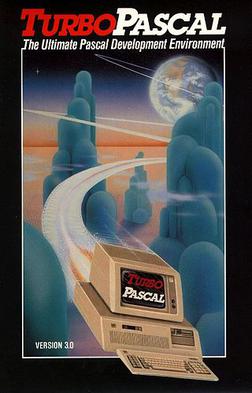Turbo Pascal
Turbo Pascal
Turbo Pascal is a software development system that includes a compiler and an integrated development environment (IDE) for the Pascal programming language. It was developed by Borland under the leadership of Philippe Kahn and was first released in 1983. Turbo Pascal was notable for its fast compilation speed, comprehensive documentation, and low price, which made it popular among hobbyists and professional developers alike.
History[edit | edit source]
Turbo Pascal was originally developed by Anders Hejlsberg as "Blue Label Pascal" for the CP/M operating system. Borland acquired the rights to the software and released it as Turbo Pascal for CP/M and MS-DOS. The first version, Turbo Pascal 1.0, was released in 1983 and quickly gained popularity due to its affordability and performance.
Subsequent versions of Turbo Pascal introduced new features and improvements. Turbo Pascal 3.0, released in 1986, added support for separate compilation and libraries, which allowed for more modular programming. Turbo Pascal 4.0 introduced a new IDE and support for object-oriented programming, which was further enhanced in Turbo Pascal 5.5.
Features[edit | edit source]
Turbo Pascal was known for several key features that contributed to its success:
- Integrated Development Environment (IDE): Turbo Pascal's IDE was one of the first to offer a full-screen editor, integrated compiler, and debugger, which streamlined the development process.
- Fast Compilation: Turbo Pascal's compiler was renowned for its speed, allowing developers to quickly compile and test their code.
- Low Cost: At a time when most compilers were expensive, Turbo Pascal was priced affordably, making it accessible to a wide range of users.
- Comprehensive Documentation: The software came with extensive documentation, including a user manual and reference guide, which helped users learn the language and the development environment.
Impact[edit | edit source]
Turbo Pascal had a significant impact on the software development industry. It popularized the Pascal language and influenced the design of later development environments. Many developers who started with Turbo Pascal went on to have successful careers in software engineering.
Turbo Pascal also laid the groundwork for Borland's later products, such as Borland Delphi, which continued the tradition of providing powerful development tools at an affordable price.
Legacy[edit | edit source]
Although Turbo Pascal is no longer actively developed, its legacy lives on. The language and its development environment inspired many modern programming tools and languages. The Free Pascal project, an open-source Pascal compiler, aims to provide a Turbo Pascal-compatible environment for modern systems.
Also see[edit | edit source]
Search WikiMD
Ad.Tired of being Overweight? Try W8MD's physician weight loss program.
Semaglutide (Ozempic / Wegovy and Tirzepatide (Mounjaro / Zepbound) available.
Advertise on WikiMD
|
WikiMD's Wellness Encyclopedia |
| Let Food Be Thy Medicine Medicine Thy Food - Hippocrates |
Translate this page: - East Asian
中文,
日本,
한국어,
South Asian
हिन्दी,
தமிழ்,
తెలుగు,
Urdu,
ಕನ್ನಡ,
Southeast Asian
Indonesian,
Vietnamese,
Thai,
မြန်မာဘာသာ,
বাংলা
European
español,
Deutsch,
français,
Greek,
português do Brasil,
polski,
română,
русский,
Nederlands,
norsk,
svenska,
suomi,
Italian
Middle Eastern & African
عربى,
Turkish,
Persian,
Hebrew,
Afrikaans,
isiZulu,
Kiswahili,
Other
Bulgarian,
Hungarian,
Czech,
Swedish,
മലയാളം,
मराठी,
ਪੰਜਾਬੀ,
ગુજરાતી,
Portuguese,
Ukrainian
Medical Disclaimer: WikiMD is not a substitute for professional medical advice. The information on WikiMD is provided as an information resource only, may be incorrect, outdated or misleading, and is not to be used or relied on for any diagnostic or treatment purposes. Please consult your health care provider before making any healthcare decisions or for guidance about a specific medical condition. WikiMD expressly disclaims responsibility, and shall have no liability, for any damages, loss, injury, or liability whatsoever suffered as a result of your reliance on the information contained in this site. By visiting this site you agree to the foregoing terms and conditions, which may from time to time be changed or supplemented by WikiMD. If you do not agree to the foregoing terms and conditions, you should not enter or use this site. See full disclaimer.
Credits:Most images are courtesy of Wikimedia commons, and templates Wikipedia, licensed under CC BY SA or similar.
Contributors: Prab R. Tumpati, MD

